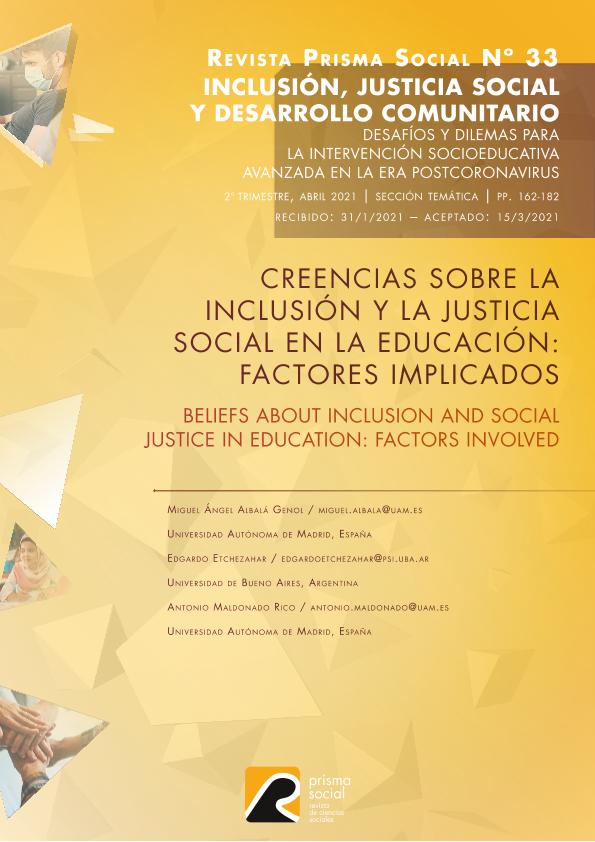Artículo
Las instituciones educativas cada vez se plantean, con una mayor frecuencia, incorporar prácticas que persigan la inclusión socioeducativa. Sin embargo, ciertas variables psicosociales pueden dificultar que se produzca este cambio entre el profesorado. El objetivo principal del presente estudio fue investigar diferentes creencias de futuros maestros y futuras maestras sobre la inclusión educativa, así como su relación con las actitudes que presentaban hacia la justicia social, la creencia en un mundo justo y la necesidad de cierre cognitivo. La muestra de estudio se compuso de 476 estudiantes de los Grados de Maestro/a en Educación Infantil y Primaria (Universidad Autónoma de Madrid, España). En la investigación se utiliza metodología cuantitativa de cara al análisis de datos del instrumento empleado, que incluye diferentes escalas tipo Likert. Los principales resultados evidenciaron relaciones entre las creencias sobre la inclusión educativa y las actitudes favorables hacia la justicia social. Además, se hallaron diferencias en las creencias sobre la inclusión educativa en función de los niveles de creencia en un mundo justo y necesidad de cierre cognitivo. Finalmente, se discute acerca de la necesidad que el profesorado considere la inclusión como un objetivo desde el que alcanzar contextos educativos y comunitarios más justos. Educational institutions are increasingly considering incorporating practices that pursue socio-educational inclusion. However, certain psychosocial variables can make it difficult for this change in teachers to take place. The main objective of the present study was to investigate different future teacher´s beliefs about educational inclusion, as well as their relationship with their social justice attitudes, believe in a just world and need for cognitive closure. The sample was composed of 476 students of the Infant and Primary Education Teaching Degrees (Autonomous University of Madrid, Spain). In the research quantitative methods are used in order to analyze the data of the different Likert-type scales used. The main results show relationships between teacher training student’s beliefs about educational inclusion and their favorable attitudes towards social justice. In addition, we found differences in participants beliefs about educational inclusion depending of their levels of believe in a just world and need for cognitive closure. In this sense, we considered relevant the incorporation of different psychosocial factors to the study of inclusion. Finally, we discussed the need for teachers to consider inclusion as an aim from which to achieve fairer educational and community contexts.
Creencias sobre la inclusión y la justicia social en la educación: factores implicados
Título:
Beliefs about inclusion and social justice in education: factors involved
Fecha de publicación:
29/04/2021
Editorial:
Universidad Nacional Autónoma de México
Revista:
Prisma Social
e-ISSN:
1989-3469
Idioma:
Español
Tipo de recurso:
Artículo publicado
Clasificación temática:
Resumen
Archivos asociados
Licencia
Identificadores
Colecciones
Articulos(CIIPME)
Articulos de CENTRO INTER. DE INV. EN PSICOLOGIA MATEMATICA Y EXP. "DR. HORACIO J.A RIMOLDI"
Articulos de CENTRO INTER. DE INV. EN PSICOLOGIA MATEMATICA Y EXP. "DR. HORACIO J.A RIMOLDI"
Citación
Albalá Genol, Miguel Angel; Etchezahar, Edgardo Daniel; Maldonado Rico, Antonio; Creencias sobre la inclusión y la justicia social en la educación: factores implicados; Universidad Nacional Autónoma de México; Prisma Social; 33; 29-4-2021; 162-182
Compartir




